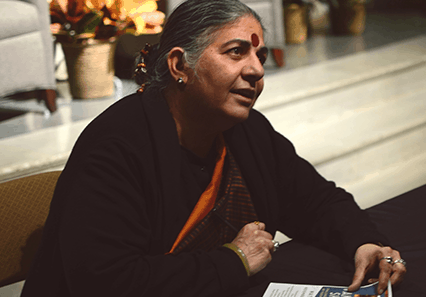Reimagining How the World is Fed

“Rejuvenating the earth should be the outcome of the food system.” Vandana Shiva made this call for awareness and action last week during her visit to Wake Forest University. On Tuesday, Nov. 4, Shiva lectured as a part of the “Make Every Bite Count” speaker series, organized by multiple partners. On Wednesday, Nov. 5, Shiva led a community forum with students, faculty, and staff at the School of Divinity.
The “Make Every Bite Count” series featured other events including a panel discussion and film screening of GMO OMG with filmmaker Jeremy Seifert. The series aimed to investigate the role of agricultural biodiversity in our local, regional, and global food systems. The final keynote lecture by Shiva highlighted the challenges and opportunities of feeding the world with sustainable agriculture.
Shiva is the author of Staying Alive: Women, Ecology, and Development and the founder of Navdanya, a national movement to protect the diversity and integrity of living resources – especially native seed – and to promote sustainable farming and fair trade. Her newest book, Who Really Feeds the World?, will be available next year.
During her lecture and in the community forum, Shiva consistently referred to the “patenting of life,” in relation to the patents held on seeds by industrial food producers. “Ecosystems produce food, not companies,” she said. “Destroying seeds destroys life. Saving seeds is an ethical duty.” The world is at a point where the diversity of creation needs to be reclaimed and valued for that diversity. Saving seeds is one way to preserve and continue the variety of life forms around us.
“We are not masters of the earth, we are a part of the earth family,” Shiva said during Tuesday’s lecture. “The process of commercial agriculture displaces diversity and people. There is a division in labor and knowledge.”
Shiva has concerns not only for the production methods of agriculture, but also the impact of food on health and wellbeing. “How we grow food is related to disease,” she said. She gave examples on how malnutrition occurs because food lacks essential minerals and the ways toxins from the chemicals used impact bodies in negative and life-threatening ways.
“Rejuvenating the earth should be the outcome of the food system.” This call echoed as Shiva gave glimpses of hope about the work that is being done and the work religious leaders are called to do on food issues. She recalled the abolition movements in the U.S. and India as a historical framework of resistance movements that changed social practices. She encouraged faith communities to plant “gardens of hope” as a beginning point of resistance. “Faith communities throughout the world already are responsible for feeding communities through soup kitchens and food pantries,” Shiva said. “Let’s link the feeding and outreach to the growing of food.”
Shiva’s call to action resounded with many. Fred Bahnson, director of the School of Divinity’s Food, Faith, and Religious Leadership Initiative, said it was encouraging to have her on campus. “She inspired us, challenged us, and made us laugh. To hear this global food leader talk about the importance of faith communities working to create food justice and ecological healing was especially encouraging, because it means we’re on the right track.”
Second-year divinity student Pia Diggs is interested in learning more about holistic health and how the food industry is impacting the food she consumes. “After hearing Shiva speak, I have an increased awareness to be more cognizant about my intake of food and a greater concern for how it is being produced,” she said. Diggs worked in a community health center last summer in a low-income area of Greensboro, NC that has been designated as a food desert. “What you eat effects your mental, physical, spiritual, and emotional states, so if you are not eating well-prepared food, it will directly affect your entire being.”
Links of Interest
Focus on food in the forest – WFU News Center
(http://news.wfu.edu/2014/11/05/focus-on-food-in-the-forest/)
Make Every Bite Count Fall Speaker Series
(https://sustainability.wfu.edu/make-every-bite-count/)
Food, Faith, and Religious Leadership Initiative)
(http://divinity.wfu.edu/food-and-faith/)
Thrive: Well-Being at Wake Forest University
About Wake Forest University School of Divinity
The Wake Forest University School of Divinity is a growing, dynamic and ecumenical theological institution that prepares men and women to be religious leaders in a changing world. The School currently offers the Master of Divinity degree and several dual degrees in law, bioethics, counseling, education, and sustainability offered jointly with other schools of the University. Through imaginative courses and diverse programs of community engagement, students are equipped to be agents of justice, reconciliation, and compassion in Christian churches and other ministries.
By Mark Batten, School of Divinity
